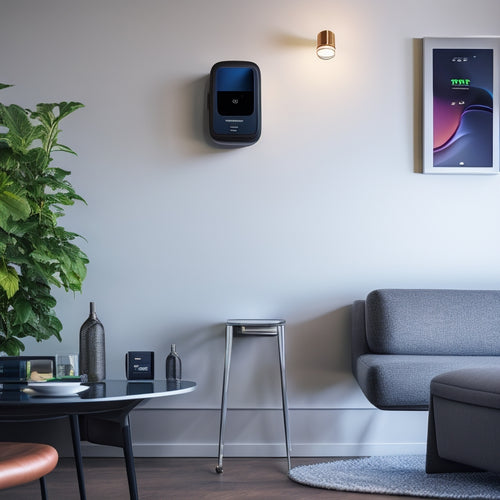
7 Blockchain Tools for Home Energy Management
Share
You can utilize blockchain technology to optimize your home's energy management through innovative solutions like blockchain-based energy trading, peer-to-peer energy sharing networks, and decentralized renewable energy certificates. Smart home energy monitoring and autonomous energy management systems can identify inefficiencies and develop demand response strategies. Transparent energy consumption tracking and secure home battery optimization also enable you to take control of your energy usage and production. These tools enable you to make informed decisions, reduce your carbon footprint, and even save on energy costs. As you investigate these state-of-the-art tools, you'll uncover even more ways to revolutionize your home's energy ecosystem.
Key Takeaways
- Blockchain-based energy management systems optimize energy efficiency in real-time, minimizing waste and reducing energy bills.
- Smart home energy monitoring integrates with blockchain to provide real-time data analytics, enabling informed energy usage decisions.
- Autonomous energy management systems utilize blockchain to analyze consumption patterns, minimizing waste and promoting renewable energy sources.
- Blockchain-based energy trading platforms enable peer-to-peer energy sharing, allowing households to buy and sell excess energy directly.
- Secure home battery optimization leveraging blockchain technology ensures real-time performance optimization, enhancing battery lifespan and overall energy storage capacity.
Blockchain-Based Energy Trading
In the domain of home energy management, blockchain technology is revolutionizing the way you trade energy. By creating a decentralized and transparent platform, you can buy and sell tokenized energy with ease. This means you'll have more control over your energy consumption and production, allowing you to optimize your energy usage and reduce waste.
Furthermore, blockchain interoperability enables seamless transactions between different energy systems, creating a unified and efficient energy market. As fleets shift to renewable energy, they can save up to 70% on annual fuel costs Electrification ROI, contributing to a more sustainable future.
With blockchain-based energy trading, you'll have the freedom to choose your energy provider, negotiate prices, and manage your energy distribution in real-time. This innovative approach enables you to take charge of your energy needs, promoting a more sustainable and autonomous future.
Smart Home Energy Monitoring
You're taking control of your energy trading, now it's time to optimize your energy usage within your home.
With smart home energy monitoring, you can integrate your smart meter data with real-time analytics to visualize your energy usage. This allows you to identify areas of inefficiency and develop demand response strategies to reduce your carbon footprint.
By leveraging solar power integration and implementing energy-efficient solutions, you can further decrease your reliance on the grid.
By managing appliance loads and optimizing energy consumption, you can access renewable energy incentives and reduce your reliance on the grid.
Blockchain-based smart home energy monitoring guarantees grid interoperability, giving you the freedom to choose your energy sources and manage your usage on your terms.
With real-time data and observations, you're enabled to make informed decisions about your energy usage, reducing waste and promoting sustainability.
Decentralized Renewable Energy Certificates
Renewable energy certificates (RECs) are the digital embodiment of clean energy, proving that one megawatt-hour of electricity was generated from a renewable source.
You can now own and trade these certificates, thanks to blockchain technology. Decentralized RECs enable certificate issuance and blockchain verification, ensuring the authenticity of renewable energy.
This integration with existing markets promotes regulatory compliance and energy provenance. As renewable energy investments in solar and wind farms increase, the demand for RECs is expected to rise, driving growth in the clean energy market.
Stakeholders engage directly, eliminating intermediaries, and trading platforms provide a secure environment for transactions. You're incentivized to invest in renewable energy, driving demand and growth.
With platform interoperability, you can seamlessly trade RECs across different networks, nurturing a global clean energy market.
Autonomous Energy Management Systems
You're likely familiar with smart home automation, where devices learn your habits to optimize energy use.
Autonomous energy management systems take this a step further by integrating blockchain technology to optimize energy efficiency in real-time. By analyzing your energy consumption patterns, these systems can automatically adjust your home's energy usage to minimize waste and reduce your energy bills.
With the integration of renewable energy sources, such as solar and wind power, these systems can further reduce your carbon footprint and reliance on traditional energy grids.
Smart Home Automation
As energy consumption continues to rise, smart home automation systems are emerging as an essential component of autonomous energy management systems, enabling homeowners to optimize their energy usage and reduce their carbon footprint.
Additionally, integrating solar-powered charging solutions Fast Charging Infrastructure can further reduce reliance on traditional power sources.
You can integrate various devices and systems into your smart home automation system, including:
- Smart thermostat integration: control your temperature and energy usage patterns remotely.
- Energy monitoring systems: track your energy consumption in real-time.
- Appliance control: turn devices on/off or adjust their settings remotely.
- Lighting control: adjust lighting levels and schedules to optimize energy usage.
Energy Efficiency Optimization
Optimizing energy efficiency is essential in autonomous energy management systems, given that it directly impacts your energy consumption and environmental sustainability.
You can achieve this by leveraging blockchain-based tools that enable demand response, grid integration, and renewable integration. By integrating energy storage systems, you can reduce your carbon footprint and optimize energy usage.
Load forecasting and energy audits help identify areas of inefficiency, allowing you to implement sustainability practices that promote consumer engagement and behavioral incentives.
With blockchain, you can securely track and verify your energy consumption, enabling you to make informed decisions about your energy usage.
Peer-to-Peer Energy Sharing Networks
You're about to investigate how peer-to-peer energy sharing networks can revolutionize home energy management.
You'll examine energy trading models that enable households to buy and sell excess energy directly with each other, guaranteeing a more efficient use of resources.
Additionally, you'll look into network security measures and decentralized energy market designs that uphold the integrity and fairness of these transactions.
Energy Trading Models
Efficiency echoes throughout the energy sector, and blockchain-based energy trading models are no exception.
As you investigate these models, you'll find they're designed to optimize energy distribution and consumption. With blockchain, you can create peer-to-peer energy sharing networks that facilitate:
-
Dynamic pricing: Adjust energy prices in real-time based on supply and demand.
-
Decentralized energy trading: Enable households to buy and sell excess energy directly with each other.
-
Automated settlements: Guarantee secure and transparent energy transactions without intermediaries.
- Regulatory compliance: Meet existing energy regulations while promoting a more decentralized energy market.
Network Security Measures
As decentralized energy trading networks proliferate, safeguarding the integrity of peer-to-peer energy sharing networks becomes paramount.
You'll need to make sure that your network is secure from unauthorized access and malicious attacks. To achieve this, you can implement cryptographic protocols to facilitate secure transactions and protect data encryption.
Access control measures will also help to verify identities and authorize transactions. Regular security audits will help identify vulnerabilities and mitigate potential threats.
Consensus mechanisms, such as proof-of-work or proof-of-stake, will guarantee that all nodes on the network agree on the state of the network, maintaining network integrity.
By prioritizing privacy preservation, you can assure that sensitive information remains confidential.
Decentralized Energy Market
With network security measures in place, the stage is set for a decentralized energy market to flourish.
You're now free to participate in peer-to-peer energy sharing networks, where individuals can buy and sell excess energy directly with each other. This decentralized approach enables energy democratization, giving you more control over your energy consumption and production.
Here are some benefits of decentralized energy markets:
-
Increased energy efficiency: By leveraging blockchain scalability, you can optimize energy distribution and reduce waste.
-
Cost savings: Buying energy directly from your neighbors can be cheaper than relying on traditional grid providers.
-
Enhanced autonomy: You have the freedom to choose where your energy comes from and how it's used.
- Environmental benefits: Decentralized energy markets promote renewable energy sources, reducing our reliance on fossil fuels.
Secure Home Battery Optimization
Optimizing your home battery's performance requires careful monitoring and control, particularly when it comes to energy storage and release.
You need to verify that your battery is storing energy efficiently and releasing it when needed. By leveraging blockchain technology, you can securely monitor and optimize your battery's performance in real-time.
This enables you to identify areas of improvement and make data-driven decisions to maximize your battery's lifespan and overall energy storage capacity.
With secure home battery optimization, you're in control of your energy storage and release, allowing you to enjoy greater freedom and independence from the grid.
Transparent Energy Consumption Tracking
You're now able to monitor and control your home battery's performance in real-time, thanks to blockchain technology.
This level of transparency allows you to track your energy consumption with precision, giving you the power to optimize your energy usage and reduce your carbon footprint.
With blockchain transparency, you can:
-
View real-time energy consumption data, enabling you to identify areas of inefficiency and make adjustments accordingly.
-
Track energy production and storage, ensuring that your home battery is operating at peak performance.
-
Verify the source of your energy, guaranteeing that you're using renewable energy sources whenever possible.
- Receive alerts and notifications, keeping you informed of any changes in your energy consumption patterns.
Frequently Asked Questions
How Does Blockchain Ensure Data Security in Home Energy Management Systems?
You thought your smart home was secure, but think again! Blockchain saves the day, ensuring data integrity by decentralizing control, making it virtually impossible for hackers to tamper with your energy usage data - now, that's freedom!
Can Blockchain-Based Energy Trading Be Integrated With Existing Grid Infrastructure?
You can integrate blockchain-based energy trading with existing grid infrastructure by ensuring grid interoperability, allowing seamless communication between decentralized marketplaces and traditional systems, and enabling secure, peer-to-peer transactions that promote energy democracy.
What Is the Cost-Benefit Analysis of Implementing Blockchain in Home Energy Management?
You'll be surprised to know that 70% of consumers are willing to pay more for energy-efficient solutions. When implementing blockchain in home energy management, you can expect a cost-benefit analysis that yields cost reduction, increased energy efficiency, simplified regulatory compliance, and enhanced consumer engagement.
Are Blockchain-Based Energy Management Systems Compatible With All Smart Home Devices?
When integrating blockchain-based energy management systems, you'll encounter interoperability challenges, ensuring seamless device compatibility is essential; not all smart home devices are compatible, so you'll need to research and verify compatibility before implementation.
Can Blockchain-Based Energy Trading Be Used for Both Residential and Commercial Properties?
You'll be intrigued to know that 65% of global energy consumption comes from buildings. Now, regarding blockchain-based energy trading, you can employ peer-to-peer trading for both residential and commercial properties, ensuring a decentralized energy market that's less bound by traditional regulation.
Related Posts
-

7 Best EV Battery Health Trackers for Homeowners
You can maximize your electric vehicle's performance and lifespan by leveraging advanced battery health trackers that...
-

3 Green HVAC Filters for Solar-Powered Homes
When outfitting your solar-powered home with an HVAC system, you'll want to choose filters that align with your commi...
-

Transform Your Outdoor Space With Recycled Plastic Lumber
By incorporating recycled plastic lumber into your outdoor design, you're not just building a deck or installing a fe...


